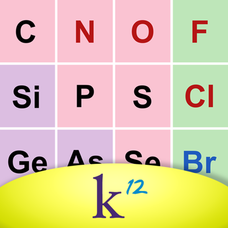Curated OER
Chapter 6 - Bonds
Although there are only 16 questions here, this chemistry handout makes a terrific unit assessment. It queries youngsters on the properties of ionic and covalent compounds, relates bond length tho stability and enrgy, compares polar and...
Curated OER
Cellular Respiration: Electron Transport chain
If you need a clarification of the electron transport chain for your pupils, then this slide show will be a great help. There are nice images of the membranes and elaborations of chemiosmosis which will provide learners support with...
Curated OER
Unit 3 Bonding
An organized table charting the different types of chemical bonds arrays this resource. The octet rule, ionization energy, and the naming of compounds are also reviewed. Young chemists answer review questions in multiple choice fashion....
Science Geek
Intermolecular Forces of Attraction
Chemists love London (dispersion forces)! Presentation begins with an explanation of intermolecular forces including hydrogen bonding, dipole-dipole attraction, and London dispersion forces. It also covers polarity and the relative...
K12 Inc.
K12 Periodic Table of the Elements
For anyone learning or teaching chemistry, nothing beats a free and interactive periodic table of the elements. Peruse the elements while learning about atomic number and mass, melting and boiling points, and many other properties of...
Virginia Department of Education
Isotopes
Lead your class through the amazing world of isotopes as they investigate the various properties they contain and further understand their respective location on the periodic table. They explore half-lives and radioactivity as each...
Virginia Department of Education
Elements and Electron Configuration
It's electronic! Pupils uncover elements and their electron configurations as they explore mass, groupings, correct charges, and sliding theory. Young scientists learn creative ways to remember various elements and correctly classify...
University of Texas
Matter and the Periodic Table Chemical Families and Periodic Trends
Is assembling the periodic table as simple as Tetris? Scholars arrange colored cards into a logical order and then make connections to the arrangement of the periodic table. Hands-on activities include adding trend arrows and analyzing...
LABScI
Atomic Structure and the Periodic Table of Elements: The Secret Agent Lab
Food always gets attention! Model atomic structure using fruit loops to represent the subatomic particles. After building models, scholars create ionic bonds using their models. Finally, they use these concepts to create a periodic table.
Biology Junction
Water Properties and More
Did you know many insects use cohesion or surface tension to walk on water? Using a presentation, scholars learn the more important properties of water. It extends into the concepts of solutions, suspensions, pH, and more.
University City High School
Metabolism Lesson Plan
Not a lesson in the traditional sense, this is a collection of resources with which you can craft a lesson on metabolic processes. It includes an outline of topics, some brief discussion, and a large array of animations, images, and...
Curated OER
Intermolecular Forces
In this intermolecular forces worksheet, students read about the two types of forces: dispersion forces and dipole-dipole forces. Students then complete 2 problems based on what they read.
Curated OER
Chemical Bonding and Shapes of Molecules
In this chemical bonds learning exercise, students review the different types of bonds, Lewis dot structures, ions, and molecule shapes. This learning exercise has 10 matching, 17 multiple choice, and 3 drawing questions.
Curated OER
The Ties that Bind
In this bonding worksheet, students read about the types of bonds that hold compounds together. They are given fifteen common materials and they identify the types of bonds that hold each together.
Curated OER
VSEPR And Polarity
In this VSEPR theory worksheet, students evaluate the electron-pair geometry of organic and inorganic molecules. They construct Lewis structures and resonance structures for 17 compounds and complete 3 short answer questions.
Curated OER
Worksheet-Bonding
In this bonding and electron configuration worksheet, students answer 9 multi-part questions including identifying the differences between bond types, drawing Lewis structures for atoms and identifying types of bonds in molecules.
Curated OER
Intermolecular Forces Worksheet
For this intermolecular forces worksheet, students answer 4 questions about the forces between atoms within molecules and compounds. Students rank the boiling points of compounds based on their intermolecular forces and they explain...
Curated OER
How Do Atoms Stick Together?
For this chemical bonding worksheet, students answer 10 questions about ionic bonding, covalent bonding, metallic bonding, Lewis structures, and intermolecular forces.
Curated OER
Properties of Ionic Compounds
In this compounds worksheet, students describe why metals and nonmetals form ionic compounds and why the formation of ionic compounds are exothermic. This worksheet has 5 short answer questions.
Curated OER
Characteristics of Crystals
In this crystals worksheet, students complete a graphic organizer by filling in the characteristics of the different crystal types including melting/boiling point and electrical conductivity.
Curated OER
Introduction to Bonding
In this chemistry worksheet, students create new and true statements while replacing false ones in order to properly define parts of the concept of bonding.
Curated OER
Periodic Table Chart Problem
In this chemistry worksheet, students fill in the correct elements with the help of the 25 questions. The end result is supposed to be a filled in and complete periodic table of elements.
Curated OER
AP Chemistry Chapter 9
In this AP Chemistry worksheet, students apply concepts of electron configuration to accurately answer the questions provided. Students also draw Lewis structures of the given elements. Students estimate the enthalpy of formation as well...
Curated OER
The Periodic Table of Elements
Eleventh graders study the use of the periodic table to develop a better understanding of the chemical elements.
Other popular searches
- Chemistry Electronegativity
- Electronegativity Energy
- Trends Electronegativity
- 3 D Electronegativity
- Electronegativity Shopping
- Chem 3d Electronegativity

























